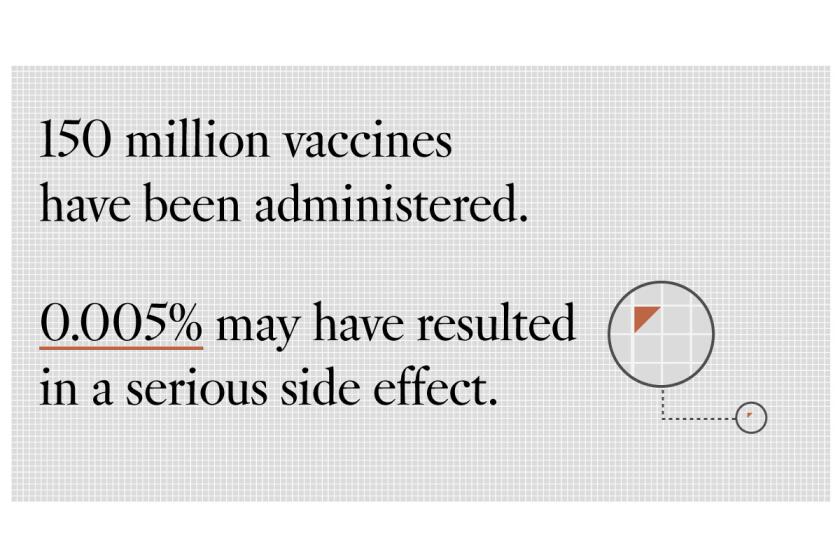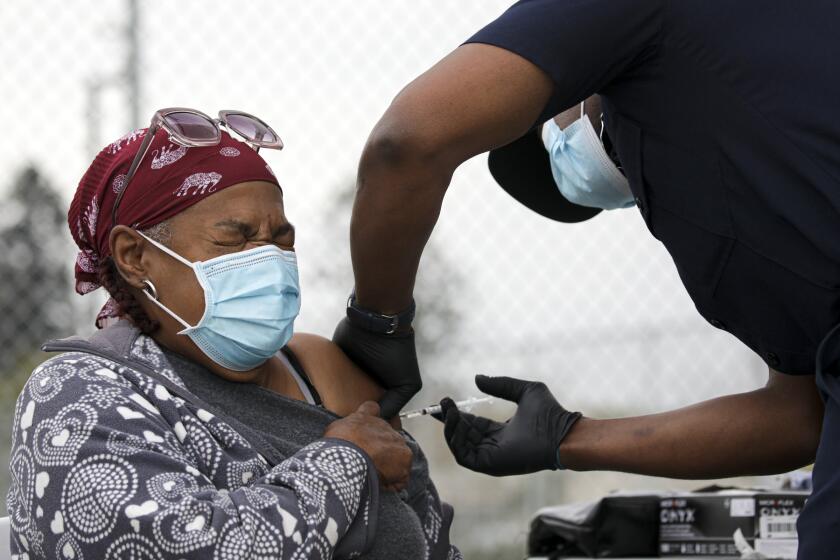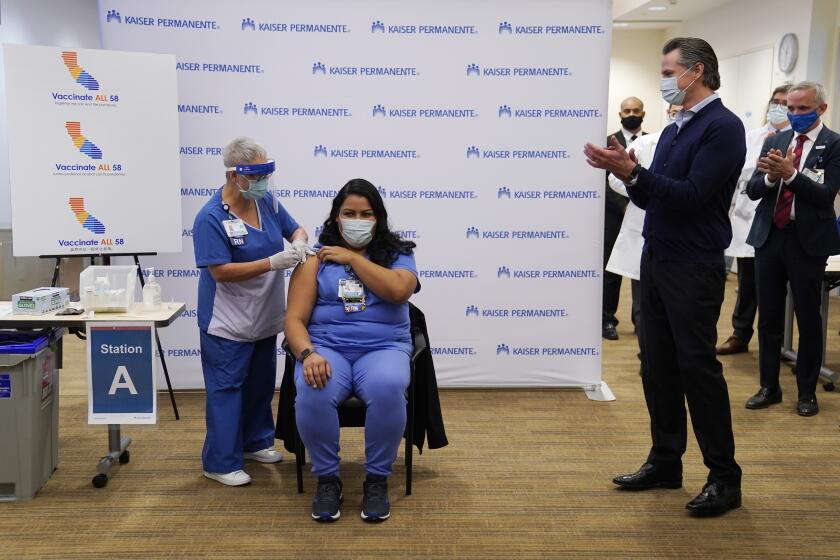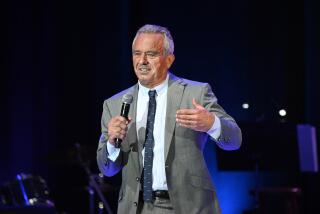COVID-19 vaccines don’t cause sudden hearing loss, study finds
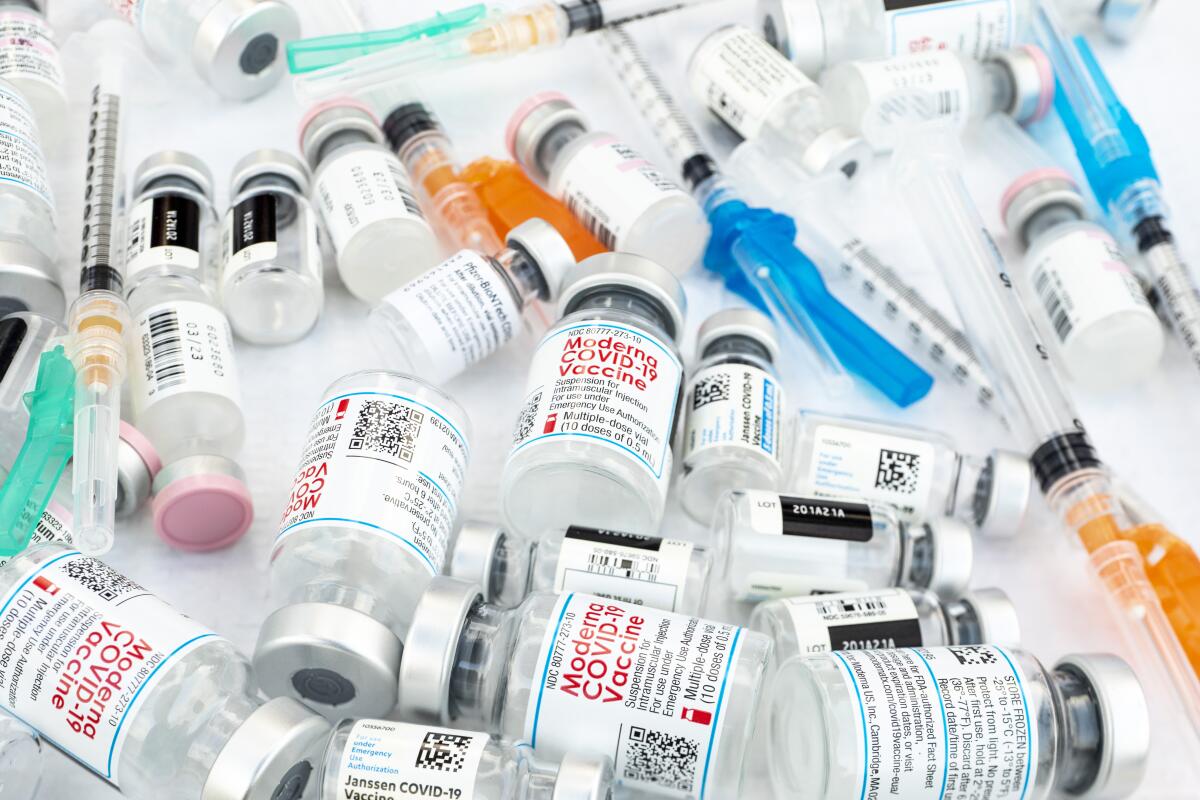
- Share via
When you administer tens of millions of doses of COVID-19 vaccine, you’re bound to get reports of all kinds of side effects. That includes accounts of sudden hearing loss.
Doctors at Johns Hopkins University treated some of the people whose hearing suffered in the wake of a COVID-19 shot, and it made them wonder whether the vaccine really could have been responsible. So they decided to investigate.
Their verdict: The vaccine wasn’t to blame. The timing of the hearing loss was just a coincidence, according to a report published Thursday in the journal JAMA Otolaryngology-Head and Neck Surgery.
The condition in question is known as sudden sensorineural hearing loss, or SSNHL. The National Institute on Deafness and Other Communications Disorders describes it as “an unexplained, rapid loss of hearing either all at once or over a few days.” It typically affects just one ear — in particular, the sensory organs of the inner ear. In about half of cases, hearing returns on its own to some extent within a couple of weeks.
Experts aren’t sure how common the condition is. The American Academy of Otolaryngology-Head and Neck Surgery estimates that for every 100,000 people, between five and 27 come down with the condition each year. About 66,000 new cases are reported annually, the academy says.
The NIDCD, which is part of the National Institutes of Health, says new cases arise at a rate of 20 to 120 per 100,000 people per year. And it notes that many cases are probably never reported to doctors because patients mistakenly presume their hearing was affected by a temporary condition, such as a sinus infection, allergies or a buildup of earwax.
In reality, SSNHL can be triggered by a range of things, including head trauma, infections (or some of the drugs used to treat them), an autoimmune disease or problems with blood circulation. In nine out of 10 cases, doctors and patients never figure out what brought it on.
Questions about COVID-19 vaccines’ safety have led to hesitancy for some Americans. Experts say there is almost zero cause for concern.
Flu shots were once blamed for cases of sudden hearing loss, but a 2016 study in the Otolaryngology-Head and Neck Surgery journal was unable to detect a link between the condition and vaccines for influenza or anything else.
The patients who came to Johns Hopkins had their sudden hearing loss confirmed with audiometric testing. All of them were affected in just one ear, and it occurred within 24 hours of getting a dose of COVID-19 vaccine.
Intrigued, the doctors set out to determine how common this was across the country. So they turned to VAERS, the Vaccine Adverse Events Reporting System run by the Centers for Disease Control and Prevention and the Food and Drug Administration.
Between Dec. 14, 2020, and March 2, 2021, VAERS received a total of 147 distinct reports of SSNHL after a COVID-19 shot. The Johns Hopkins doctors evaluated those reports and determined that 40 of those cases were both credible (that is, they were sent in by a doctor and included solid documentation) and plausibly related to administration of a COVID-19 vaccine (they occurred within three weeks of getting a shot).
Of those 40 cases, 25 were women and 15 were men. They ranged in age from 25 to 88, with an average age of 56. (SSNHL typically strikes people in their late 40s or early 50s.)
The side effects of a second shot of COVID-19 vaccine are a sign that it’s providing more vigorous, long-lasting protection against the coronavirus.
Twenty-eight of them had received the vaccine made by Pfizer and BioNTech, and 12 got the one from Moderna. (None of the cases involved the Johnson & Johnson single-dose vaccine, which was authorized by the FDA just days before the study period ended.)
According to the CDC, a total of 86,553,330 doses of vaccine went into arms in the U.S. during the roughly 12-week window they examined.
To come up with the lowest possible incidence of vaccine-related sudden hearing loss, the researchers imagined that all of those doses were given to separate people, and that only 40 of them developed SSNHL. On an annualized basis, that would work out to 0.3 cases per 100,000 people.
To calculate the highest possible incidence, the researchers counted all 147 VAERS reports and assumed that only 43,276,665 people got vaccinated (with each of them receiving two doses). On an annualized basis, that would mean 4.1 cases per 100,000 people.
But even that was well below the SSNHL incidence observed in the U.S. before the advent of COVID-19 vaccines. According to a 2013 study in the journal Otology & Neurotology, the low end of that range was 11 cases per 100,000 people for patients under age 18, and the high end was 77 cases per 100,000 for patients who were 65 or older.
For most people, side effects should be mild and may include flu-like symptoms for a day or two. People with severe allergies should consult a doctor.
No matter how you look at it, it’s clear that COVID-19 vaccines aren’t fueling any increase in cases of sudden hearing loss, the Johns Hopkins doctors concluded.
“No association exists” between the Pfizer-BioNTech and Moderna vaccines on the one hand and SSNHL on the other, they wrote.
“We hope these findings will reassure healthcare clinicians and patients to receive all scheduled doses of the vaccination as recommended by current public health guidelines,” they added.
